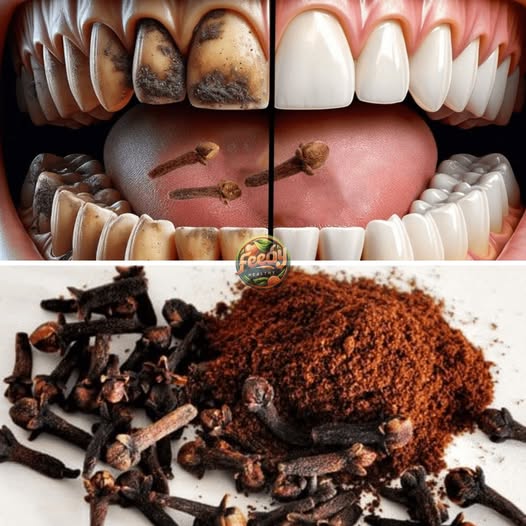ADVERTISEMENT
## 5. **Use a Saltwater Rinse**
Saltwater has natural antibacterial properties that can help cleanse your mouth and reduce plaque buildup. It can also help with gum health by soothing irritated gums and preventing inflammation.
**How to Use Saltwater Rinse**:
1. Mix **1 teaspoon of salt** in a cup of warm water.
2. Swish the solution around in your mouth for 30 seconds to 1 minute.
3. Spit it out and rinse with water.
You can use this remedy once or twice a day, especially after meals.
**Why It Works**:
Salt has natural antiseptic and antibacterial properties, which can help kill bacteria that contribute to plaque buildup and gum disease. It also helps soothe inflamed or irritated gums.
—
## 6. **Tea Tree Oil Mouthwash**
Tea tree oil has powerful antibacterial properties that make it an effective remedy for reducing plaque and tartar buildup. This essential oil has been shown to fight the bacteria that cause plaque formation, making it a great addition to your oral care routine.
**How to Use Tea Tree Oil**:
1. Mix **a few drops of tea tree oil** with a cup of water.
2. Swish the solution around your mouth for 30 seconds, then spit it out.
3. Rinse with water.
**Note**: Tea tree oil should never be swallowed, and it should always be diluted with water before use in the mouth.
**Why It Works**:
Tea tree oil’s antimicrobial properties help eliminate bacteria that contribute to plaque buildup. It also has anti-inflammatory effects, which can benefit the gums and help prevent gum disease.
—
## 7. **Chew Sugar-Free Gum**
Chewing sugar-free gum can help stimulate saliva production, which plays a crucial role in neutralizing acids and washing away food particles and bacteria that contribute to plaque buildup. The chewing motion can also help to dislodge plaque from the teeth.
**How to Use**:
Chew **sugar-free gum** for 10–15 minutes after meals or snacks to help clean your teeth naturally.
**Why It Works**:
Saliva contains natural antibacterial agents and helps to wash away debris from the teeth. Chewing gum stimulates the production of saliva, which helps to neutralize acids and keep the mouth clean.
—
## 8. **Hydrogen Peroxide Rinse**
Hydrogen peroxide has been used for years as a natural teeth-whitening agent due to its mild bleaching properties. It can also help kill bacteria in the mouth, reducing plaque and tartar buildup.
**How to Use Hydrogen Peroxide**:
1. Mix **equal parts of hydrogen peroxide (3%) and water**.
2. Swish the solution around your mouth for 30 seconds to 1 minute.
3. Rinse thoroughly with water.
**Important**: Do not swallow hydrogen peroxide, and make sure the solution is diluted properly before use.
**Why It Works**:
Hydrogen peroxide is a powerful antimicrobial agent that helps kill bacteria in the mouth, reducing plaque and tartar buildup. It also helps to whiten teeth and improve overall oral hygiene.
—
## 9. **Good Oral Hygiene Habits**
No matter how many natural remedies you try, good oral hygiene practices are the foundation of plaque and tartar prevention. Regular brushing and flossing are essential to keeping your teeth clean and free from plaque buildup.
**Essential Oral Hygiene Practices**:
– **Brush your teeth** at least twice a day with fluoride toothpaste. Make sure to brush for at least 2 minutes and use a soft-bristled toothbrush to avoid damaging your gums and enamel.
– **Floss daily** to remove food particles and plaque from between your teeth that your toothbrush might miss.
– **Use an antimicrobial mouthwash** to reduce bacteria in your mouth.
– **Visit the dentist regularly** for check-ups and professional cleanings to remove any tartar that may have built up.
**Why It Works**:
Brushing and flossing are the most effective ways to remove plaque before it hardens into tartar. Using mouthwash also helps eliminate bacteria and freshen breath.
—
## Conclusion
Plaque and tartar buildup are common oral health issues that can lead to cavities, gum disease, and other dental problems if left untreated. While professional cleanings are necessary to remove tartar, you can take steps at home to help prevent and reduce plaque buildup. By incorporating these **9 natural remedies** into your routine—such as oil pulling, using baking soda, eating crunchy fruits and vegetables, and practicing good oral hygiene—you can maintain a healthier, cleaner mouth and reduce the chances of plaque and tartar formation.
Remember, while natural remedies can be effective, they should be used in conjunction with regular brushing, flossing, and visits to your dentist. These practices will help ensure that your teeth and gums stay healthy for years to come.
